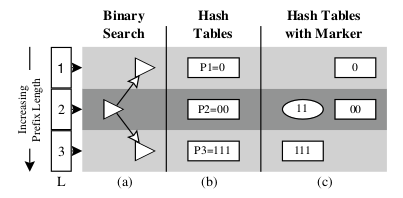
Links
Abstract
All global routing protocols use hierarchies to allow scaling to a world wide community while keeping the routing database size manageable. Databases of variable length prefixes are a powerful tool for providing this in a flexible manner, but require a Longest Prefix Matching algorithm. In this paper, we report a fundamentally new solution that is both algorithmically interesting and practical.
Our scheme is based on doing binary search on hash tables organized by prefix lengths, and scales very well as address and routing table sizes increase: independent of the table size, it requires a worst case time of log2(address bits) hash lookups. With the current Internet Protocol, which uses 32 bit addresses, at most 5 hash lookups are needed; for the upcoming 128 bit addresses of the next generation Internet Protocol (IPv6), 7 lookups suffice. Several refinements, including specializing the Binary Search with every match, considerably reduce the average number of hash search steps to less than 2.
BibTeX (Download)
@inproceedings{Waldvogel1998Scalable,
title = {Scalable Best Matching Prefix Lookups},
author = {Marcel Waldvogel and George Varghese and Jon Turner and Bernhard Plattner},
url = {https://netfuture.ch/wp-content/uploads/1998/waldvogel98scalable.pdf},
year = {1998},
date = {1998-06-30},
urldate = {1000-01-01},
booktitle = {Proceedings of PODC '98},
pages = {311},
address = {Puerto Vallarta, México},
abstract = {All global routing protocols use hierarchies to allow scaling to a world wide community while keeping the routing database size manageable. Databases of variable length prefixes are a powerful tool for providing this in a flexible manner, but require a Longest Prefix Matching algorithm. In this paper, we report a fundamentally new solution that is both algorithmically interesting and practical.
Our scheme is based on doing binary search on hash tables organized by prefix lengths, and scales very well as address and routing table sizes increase: independent of the table size, it requires a worst case time of log_{2}(\textit{address bits}) hash lookups. With the current Internet Protocol, which uses 32 bit addresses, at most 5 hash lookups are needed; for the upcoming 128 bit addresses of the next generation Internet Protocol (IPv6), 7 lookups suffice. Several refinements, including specializing the Binary Search with every match, considerably reduce the average number of hash search steps to less than 2.},
keywords = {Fast Routers},
pubstate = {published},
tppubtype = {inproceedings}
}


